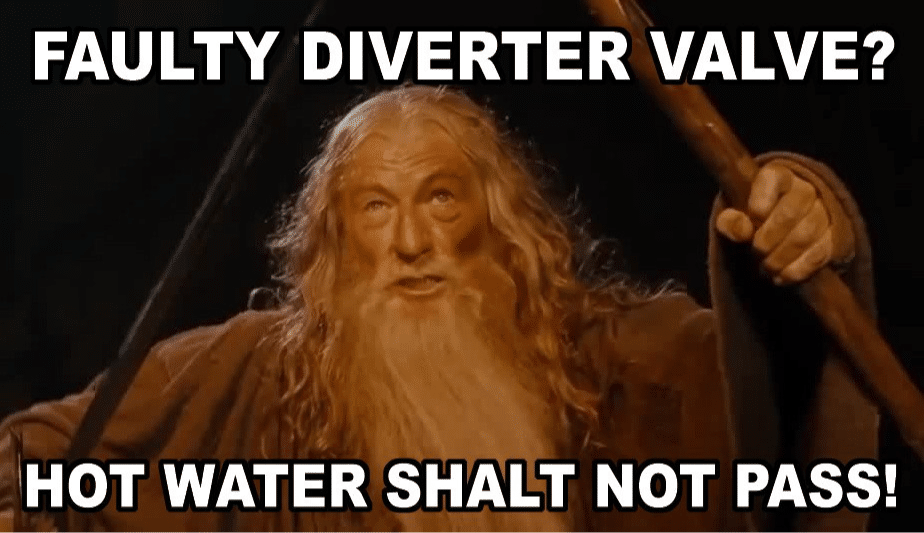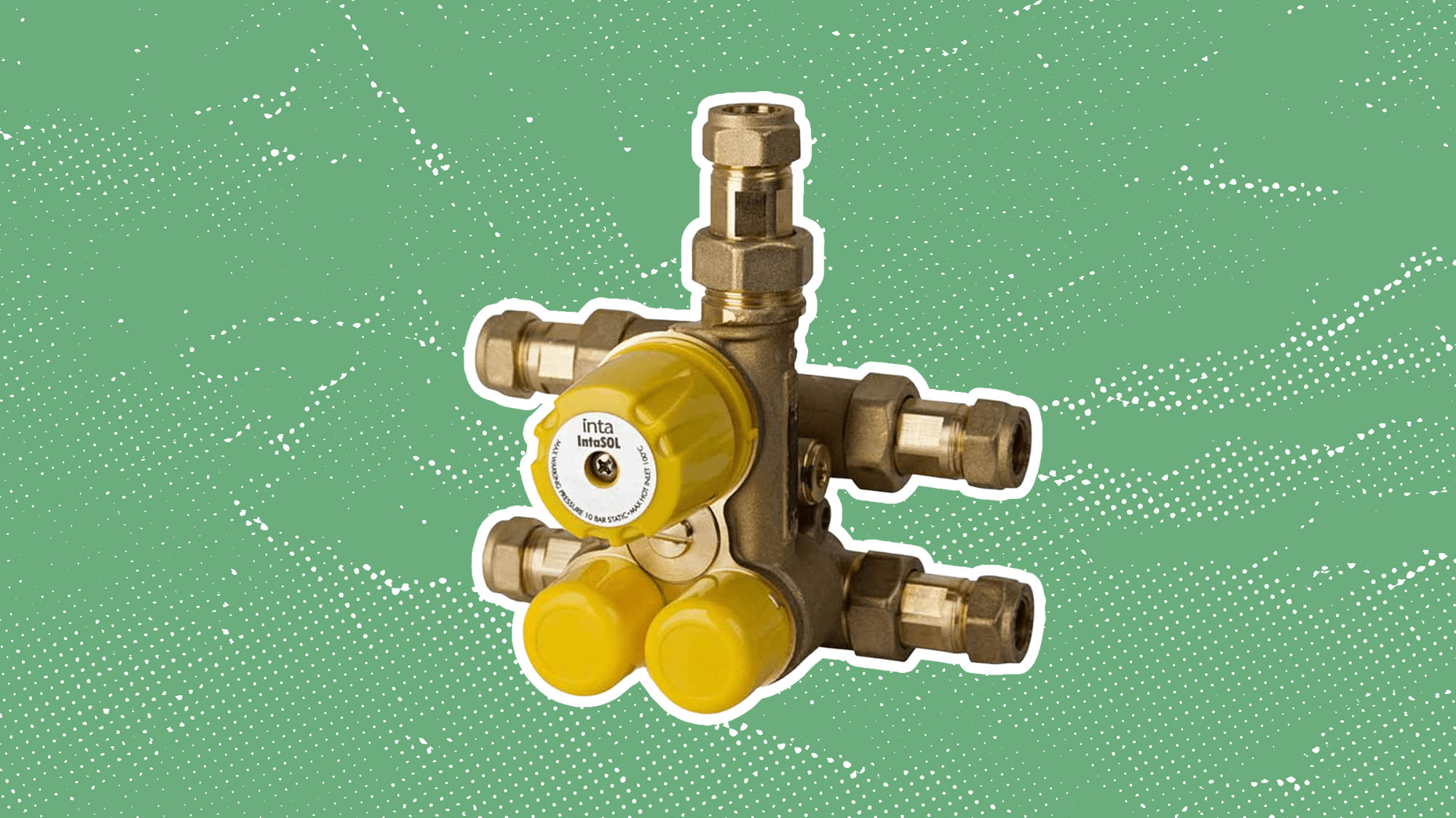Engineers train for years to be able to delicately tell families that their boiler has a faulty diverter valve. We won't sugarcoat it, the prognosis isn't good.
The diverter valve is a boiler component that is prone to failing in older boilers, typically in those over 10 years old.
Small but mighty, diverter valves main role is to divert your hot water to your taps or your radiators (kind of crucial), so, when it fails at performing this primary function, it can cause chaos and wreak total havoc in your home heating system.
So, what can you do if your diverter valve fails?
In this post, we are going to answer some of the most common questions and offer some practical advice.
Note: if you are suffering from lukewarm water, you may potentially have a faulty heat exchanger.
Need to know the cost of a new boiler, quick? Find out what replacement you need along with costs (takes 60 seconds).
What is a boiler diverter valve?
A diverter valve can be found in nearly all combi boilers and provides a fundamental mechanical function – it essentially controls the flow of your hot water.

It allows you to control where your hot water is sent on-demand i.e. to your shower or taps.
This is a mechanism unique to combi boilers and since they do not have a hot water storage cylinder-like system boilers, a diverter is required to control where the hot water flows to.
Learn all about combi boilers in our what is a combi boiler guide.
Want an exact price on a new boiler? Use our boiler quote calculator (no personal details needed).
What does a diverter valve do?
One of the major roles of your boiler is to control the flow of water depending on what is currently being used.

For example, if you turn your hot tap on, the diverter valve will shut off the water flowing to your radiators and redirect it to your taps.
Basically, Gandalf is living inside your boiler and deciding who or what get's to pass, when.
Once you have turned the tap off, the valve will re-open, allowing water to flow through your heating system again. This enables you to have hot water on demand, whether you are using your radiators or not.
System and conventional boilers do not need a valve since hot water is stored in a separate cylinder (heated by the boiler, or immersion heater), so you can use your hot water and heating simultaneously without the flow rate being affected.
How do you know if your diverter valve has a fault?
Boilers can stop working for a plethora of reasons so diverse it makes UKIP members throw up, especially those at the older end of the spectrum.
So, how do you know if it is a faulty diverter valve that is the root of your broken boiler blues?
Want an exact price on a new boiler? Use our boiler quote calculator (your fixed price will appear on screen).
Diverter valves are mechanical components designed to open and close and after several years, they can become worn, prone to sticking and generally misbehaving.
If you have a faulty diverter valve, you are likely to experience one of the following issues, or if you're super unlucky, a full house of these faults:
#1 - Hot water running cold (at the water outlets)


One of the most frequent complaints of a faulty diverter valve is hot water running cold, or lukewarm.
The combi boiler should prioritise hot water outlets when in use and not your heating, however, if the valve is slightly stuck open, the water flow rate may not be adequate to provide the necessary heating output.
Related boiler guides:
#2 - You've got hot water but no heating

If you find that your heating is not working but your water outlets i.e. taps and shower have running hot water, this may be a sign of a fault with your diverter valve.
In this case, your diverter valve may be stuck on the hot water side, resulting in the valve being unable to open to allow the flow of hot water, thereby blocking water flow to your radiators, only allowing hot water to flow through your taps.
Note: if you're radiators aren't getting hot, you may simply need a power flush of your heating system
#3 - You have to leave your heating on to get running hot water

If you find that your taps will only run hot when your heating is on, this is another sign of a fault with your diverter, potentially one that is sticking and preventing the water from flowing to your taps.
Is your boiler making a lot of noise? Find out why in our noisy boiler guide.
How do you repair a faulty diverter valve?
If you have an issue with your boiler, especially a suspected internal issue, you should consult the help of a qualified Gas Safe Engineer.
An engineer will know just how to diagnose your boiler problem and determine if the issues you are facing are caused by a faulty diverter or something else.
If your boiler diverter valve is malfunctioning, it could be a result of a component in disrepair, this is commonly the diaphragm, yet typically the engineer will opt to replace the whole part to keep labour costs and repair time to a minimum.
Your new boiler face
Since a faulty diverter valve is a common issue in boilers that are old as mould, it may be time to consider having a new one installed.

Old as mould boilers, especially those that have passed their warranty period are increasingly likely to experience faults and need expensive repairs.
Securing yourself a snazzy, modern boiler (via Heatable.co.uk) means that you are also covered by a fresh warranty.
...for example, we could install a Worcester Bosch combi boiler, with a whopping 10 year guarantee (which includes all parts and labour), from just £2,185. With monthly payment options 😍
If you choose to stay with your old boiler, you must face up to the fact that it is increasingly likely to let you down and cost an absolute fortune in repairs.
Want to save money and energy on your heating bills? If so, you should consider installing one of the best smart thermostats.
You may be interested in Gas Engineer Allen Hart explaining the most common boiler problems and how you can resolve them in the video below:
Costs to repair a faulty diverter valve
If you need to replace your diverter valve, then you should be looking to pay anywhere from £300 to £750.
These costs can be impacted by constantly changing costs of parts, as well as local labour rates (if you live in London, sorry).
The two main costs are:
#1 - Cost of the diverter valve itself
The cost of a diverter valve can vary tremendously depending on the model of your boiler, but on average, they cost around £200, yet some manufacturers charge considerably more and do not include any labour costs.
#2 - Labour costs
As well as the cost of the replacement diverter valve, you need to consider the cost of the engineer’s labour.
Labour costs can vary considerably depending on where in the UK you are located, with places like London being significantly more expensive than the national average.
The ease of installation is also a factor, more challenging boilers are going to take longer, so will cost more considering most engineers charge on a per-hour basis.
If you need an emergency call out, you should expect to pay a further premium on top. This can easily end up costing a few hundred pounds.
When you consider all these costs, it is easy to understand why a boiler replacement with a warranty is appealing.
Need to know the cost of a new boiler, quick? Find out what replacement you need along with costs (takes 60 seconds).
How to get a new boiler 👻
You may need a new boiler.
You may need it fast and with affordable monthly payments.
You may even need it from a company with top end local engineers, with 10,000 Trust Pilot reviews to back them up. Plus a Which? Trusted Trader award for good measure.
You may need a new boiler quote from us, Heatable 😘





